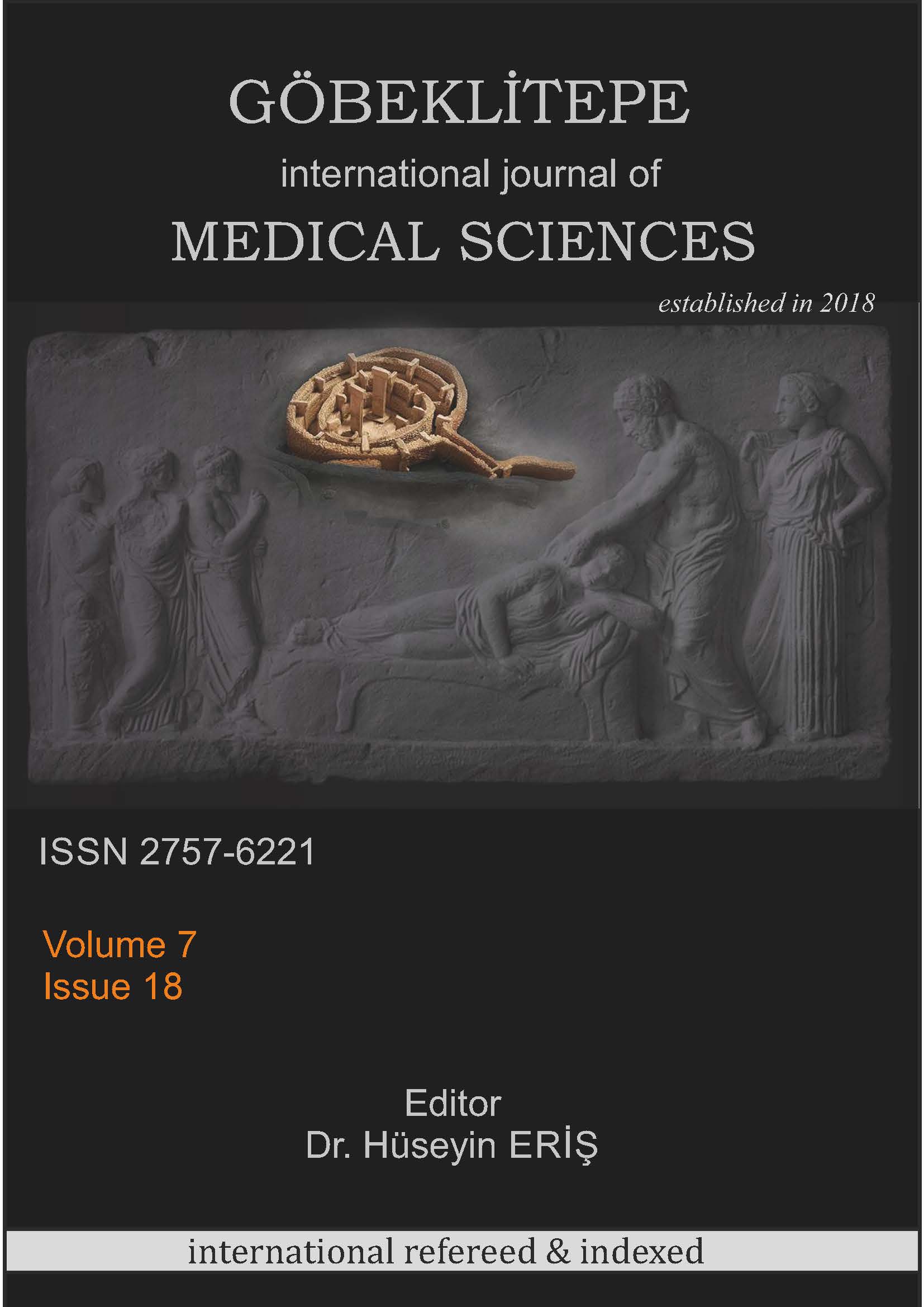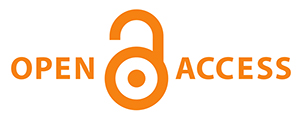EXAMINING THE EFFECT OF THE CORONAVIRUS PANDEMIC ON EATING AND THE FOOD CONSUMPTION HABITS OF YOUNG ADULTS: THE CASE OF OSMANIYE
Keywords:
Yeme Alışkanlıkları, Besin Tüketim Alışkanlıkları, Koronavirüs, Pandemi, Genç YetişkinlerAbstract
In this study; it was aimed to evaluate the effect of the coronavirus pandemic on eating and the food consumption habits of young adults. The study included 442 young adults aged 19-39 years. Data were obtained with a survey form questioning information on food consumption habits, before the Covid-19 pandemic and during the normalization period of the Covid-19 pandemic. Descriptive analyses were used in the evaluation of the data. The average age of the individuals participating in the study was 23.1±4.2 years and 64.7% were female. 63.6% had normal weight. The frequency of eating three meals a day was 47.1%. During the Covid-19 pandemic, 31.9% of individuals stated that the number of meals increased, 41.4% developed night eating behavior, and 38.2% gained weight. When the consumption frequency of food groups was compared with the pre-pandemic period, the consumption frequency of food groups (except for the fruit group) remained mostly unchanged. The food group with the highest increase in consumption was the fruit group (50.2%). 58.8% of young adults increased their consumption of tea, coffee and other beverages and 19.5% increased their consumption of ready-made foods. 39.4% of the participants consumed products such as medicinal plants to protect themselves from the virus. Participants' frequency of using nutritional supplements and/or herbal products increased. The most increased nutritional supplement compared to pre-pandemic period was vitamin C. The pandemic had both positive and negative effects on eating habits of young adults. As a result of the study, during the pandemic period it was evaluated that approximately one third of young adults increased the number of meals, the food consumption habits of the majority of the participants did not change, the use of dietary supplements and herbal products was found to have approximately doubled.
References
Aksoy, M. Ansiklopedik Beslenme Diyet ve Gıda Sözlüğü. Ankara Nobel Tıp Kitabevleri, 1.Baskı, 2018.
Kartal A, Ergin E, Kanmış HD. (2020) Covid-19 Pandemik Salgın Döneminde Yaşam Kalitesini Arttırmaya Yönelik Sağlıklı Beslenme ve Fiziksel Aktivite Önerileri, Eurasian JHS, 3 (Covid-19 Special Issue):149-155.
Türkiye Bilimler Akademisi, 2020 TÜBA - Bağışıklık, Beslenme ve Yaşam Tarzı Raporu. https://www.tuba.gov.tr/tr/yayinlar/suresiz-yayinlar/raporlar/bagisiklik-beslenme-ve-yasam-tarzi-raporu-1
Alhusseini N, Alqahtani A. (2020). Covid-19 pandemic's impact on eating habits in Saudi Arabia. J Public Health Res.,9(3):1868.
Laviano A, Koverech A, Zanetti M. (2020). Nutrition support İn the time of SARS-CoV-2 (Covid-19). Nutrition, 74:1-2.
Di Renzo L, Gualtieri P, Pivari F, et al. (2020). Eating habits and lifestyle changes during Covid-19 lockdown: an Italian survey. J Transl Med. 2020;18(1):229.
Jia P, Liu L, Xie X, Yuan C, Chen H, Guo B, Zhou J, Yang S. (2021). Changes in dietary patterns among youths in China during COVID-19 epidemic: The COVID-19 impact on lifestyle change survey (COINLICS). Appetite. 1;158:105015.
T.C.İçişleri Bakanlığı https://www.icisleri.gov.tr/81-il-valiligine-kademeli-normallesme-tedbirleri-genelgesi-gonderildi
Dilber A., Dilber F. (2020). Koronavirüs (Covid-19) Salgınının Bireylerin Beslenme Alışkanlıkları Üzerindeki Etkisi: Karaman İli Örneği, Journal of Tourism and Gastronomy Studies, 8 (3), 2144-2162.
Kalaycı, Z., & Şahin Kaya, A. (2023). Covid-19 Pandemi Öncesi ve Sırasında Besin Destekleri Kullanım Durumu ve Akdeniz Diyet Kalite İndeksi Skorları: Üniversite Öğrencileri Örneği, Türkiye: Kesitsel Çalışma. Turkiye Klinikleri Journal of Health Sciences/Türkiye Klinikleri Sağlık Bilimleri Dergisi, 8(3).
Błaszczyk-Bębenek E, Jagielski P, Bolesławska I, Jagielska A, Nitsch-Osuch A, Kawalec P. (2020). Nutrition Behaviors in Polish Adults before and during Covid-19 Lockdown. Nutrients, 12(10):3084.
Souza TC, Oliveira LA, Daniel MM, Ferreira LG, Della Lucia CM, Liboredo JC, Anastácio LR. (2022). Lifestyle and eating habits before and during Covid-19 quarantine in Brazil. Public Health Nutr. 25(1):65-75.
Garipoğlu G., Bozar N.(2020). Covid-19 Salgınında Sosyal İzolasyonda Olan Bireylerin Beslenme Alışkanlıklarındaki Değişiklikler, Pearson Journal, 5(6), 100-113.
Uzdil, Z., Kaya, S., & Çakıroğlu, F. P. (2021). Evaluation of Nutritional Habits Of University Students: A Cross-Sectional Study During The Covıd-19 Pandemic. İnönü Üniversitesi Sağlık Hizmetleri Meslek Yüksek Okulu Dergisi, 9(1), 10-18.
Erdoğan Yüce, G ve Muz G. (2021). Covid-19 Pandemisinin yetişkinlerin Diyet davranışları, Fiziksel Aktivite ve Stres düzeyleri üzerine Etkisi. Cukurova Medical Journal, 46(1), 283-91.
Kurku H, Solak İ, Gederet Y.T, Eryılmaz M.A. (2021). Sigara Kullanımının Yüksek Duyarlıklı C-Reactive Protein/Albümin Oranı Üzerine Etkisi, Türk Klinik Biyokimya Dergisi, 19(1), 77-84.
Mehmet N, Özlem A. (2020). Eating Habits Changes During Covid-19 Pandemic Lockdown. ESTÜDAM Halk Sağlığı Dergisi, 5:169-77.
Koçyiğit, E., Esgin, Ö., & Köksal, E. (2022). Türkiye’nin Değişen Beslenme Örüntüsü. Beslenme ve Diyet Dergisi, 50(3), 40-52.
Eskici G. Covid-19 Pandemisi: Karantina İçin Beslenme Önerileri. (2020). Anadolu Klin. 25(Special Issue on COVID 19):124-9
Siyasal, K. (2023). Covıd-19’un Önlenmesi ve Tedavisinde Beslenmenin Önemi İle C ve D Vitaminlerine Dair Yaklaşımlar. Gazi Sağlık Bilimleri Dergisi, 8(1), 32-42. https://doi.org/10.52881/gsbdergi.1138745
Muslu, M. (2021). Sars Cov-2 (Covid-19) Yönetiminde Çinko, Bakır, Selenyum ve Magnezyumun Etkinliği ve Önemi. Sakarya Üniversitesi Holistik Sağlık Dergisi, 4(3), 167-182.
Dinçer, S., & Kolcu, M. (2021). Covid-19 pandemisinde toplumun beslenme alışkanlıkların incelenmesi: İstanbul örneği. Türkiye Diyabet ve Obezite Dergisi, 5(2), 193-201.
Demir G, Kılıçkalkan B, Takak MK. (2021). COVID-19 Pandemisi Sürecinde Yetişkinlerin Besin Destekleri Kullanımlarının İncelenmesi. Genel Tıp Derg. 31(4):430-9.
Ilie, P. C., Stefanescu, S., & Smith, L. (2020). The role of vitamin D in the prevention of coronavirus disease 2019 infection and mortality. Aging Clin Exp Res, 1-4. doi:10.1007/s40520-020-01570-8
Boretti, A., & Banik, B. K. (2020). Intravenous Vitamin C for reduction of cytokines storm in Acute Respiratory Distress Syndrome. PharmaNutrition, 12, 100190. doi:10.1016/j.phanu.2020.100190
Carr, A. C. (2020). A new clinical trial to test high-dose vitamin C in patients with Covid-19. Critical Care, 24(1), 133. doi:10.1186/s13054-020-02851-4
Cheng, R. Z. (2020). Can early and high intravenous dose of vitamin C prevent and treat coronavirus disease 2019 (Covid-19) In Med Drug Discov., 5, 100028.
Pecora, F., Persico, F., Argentiero, A., Neglia, C., & Esposito, S. (2020). The role of micronutrients in support of the immune response against viral infections. Nutrients, 12(10), 3198.
Muslu, M., & Ersü, D. Ö. (2020). Yeni Koronavirüs (SARS-CoV-2/Covid-19) pandemisi sırasında beslenme tedavisi ve önemi. Beslenme ve Diyet Dergisi, 48(1), 73-82.
Downloads
Published
Versions
- 2024-12-29 (3)
- 2024-12-29 (2)
- 2024-12-27 (1)
How to Cite
Issue
Section
License
Copyright (c) 2024 Göbeklitepe Sağlık Bilimleri Dergisi

This work is licensed under a Creative Commons Attribution 4.0 International License.




